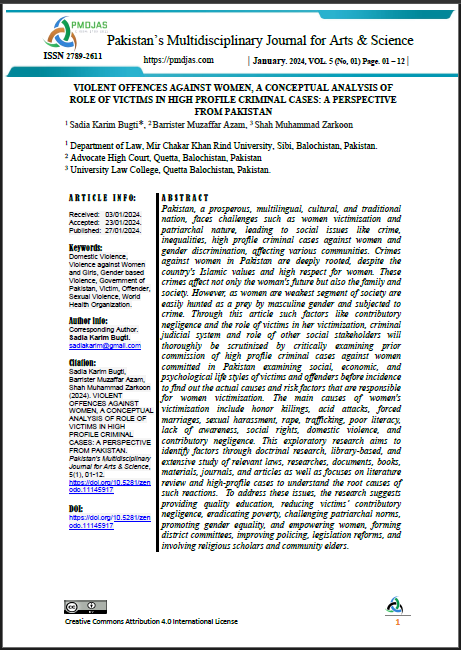Violent Offences Against Women, A Conceptual Analysis of Role of Victims in High Profile Criminal Cases: A Perspective from Pakistan
DOI:
https://doi.org/10.5281/zenodo.11145917Abstract
Pakistan, a prosperous, multilingual, cultural, and traditional nation, faces challenges such as women victimization and patriarchal nature, leading to social issues like crime, inequalities, high profile criminal cases against women and gender discrimination, affecting various communities. Crimes against women in Pakistan are deeply rooted, despite the country's Islamic values and high respect for women. These crimes affect not only the woman's future but also the family and society. However, as women are weakest segment of society are easily hunted as a prey by masculine gender and subjected to crime. Through this article such factors like contributory negligence and the role of victims in her victimization, criminal judicial system and role of other social stakeholders will thoroughly be scrutinized by critically examining prior commission of high profile criminal cases against women committed in Pakistan examining social, economic, and psychological life styles of victims and offenders before incidence to find out the actual causes and risk factors that are responsible for women victimization. The main causes of women's victimization include honor killings, acid attacks, forced marriages, sexual harassment, rape, trafficking, poor literacy, lack of awareness, social rights, domestic violence, and contributory negligence. This exploratory research aims to identify factors through doctrinal research, library-based, and extensive study of relevant laws, researches, documents, books, materials, journals, and articles as well as focuses on literature review and high-profile cases to understand the root causes of such reactions. To address these issues, the research suggests providing quality education, reducing victims’ contributory negligence, eradicating poverty, challenging patriarchal norms, promoting gender equality, and empowering women, forming district committees, improving policing, legislation reforms, and involving religious scholars and community elders.
Downloads






